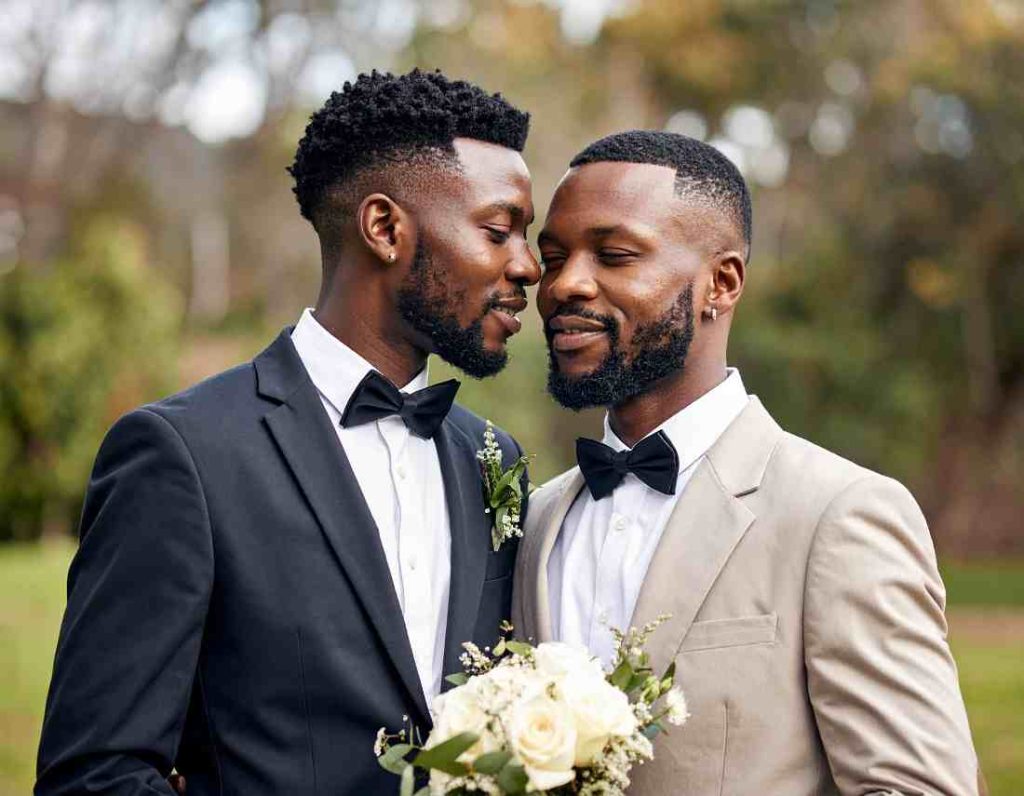By DNB Editors.

On November 10, 2025, the U.S. Supreme Court delivered a quiet but powerful win for marriage equality: the Court declined to hear former Kentucky county clerk Kim Davis’s petition asking for financial immunity and a reconsideration of Obergefell v. Hodges (2015), the ruling that legalised same-sex marriage nationwide (Aulbach, 20253; SCOTUSblog, 2025)11.
Though procedural, this denial preserves critical legal protections for LGBTQ+ families. It keeps Davis accountable for refusing marriage licenses in 2015 and safeguards the broader legal foundation supporting same-sex marriage—at least for now (GLAD Law, 2025)6.
🏛️ The Case: Why Kim Davis Went Back to the Supreme Court
In 2015, immediately after Obergefell, Davis refused to issue marriage licenses to same-sex couples, citing her religious beliefs (ABC News, 2025)1. Her refusal resulted in lawsuits by several couples, including David Moore and James Yates.
A federal jury later awarded the couple $100,000 in emotional-distress damages, while subsequent fees pushed Davis’s liability even higher (Aulbach, 2025)3. Davis appealed, arguing that:
- Her religious objections should legally shield her from issuing licenses.
- She should be immune from financial penalties.
- Obergefell should be reconsidered or overturned (SCOTUSblog, 2025)11.
The U.S. Court of Appeals for the Sixth Circuit rejected these arguments. Davis then petitioned the Supreme Court.
By denying certiorari (a court order by which a higher court reviews a lower court’s decision), the Court left both the damages and the Obergefell precedent untouched—affirming that public officials cannot ignore constitutional mandates due to personal beliefs (Aulbach, 2025)3.

⚖️ The Precedent: What Obergefell v. Hodges Protects
In Obergefell v. Hodges (2015), the Supreme Court held that the Fourteenth Amendment guarantees same-sex couples the fundamental right to marry. The ruling emphasised that denying marriage equality creates measurable stigma and unequal treatment (Justia, 20157; Legal Information Institute, n.d.)10.
The decision built on earlier LGBTQ+ legal milestones such as:
- Lawrence v. Texas (2003) — struck down sodomy bans (Legal Information Institute, n.d.)10.
- United States v. Windsor (2013) — required federal recognition of same-sex marriages (Justia, 2013)8.
Davis’s petition attempted to revive a conservative legal argument that surfaced after the Court overturned Roe v. Wade in Dobbs v. Jackson Women’s Health Organisation (2022). In his Dobbs concurrence, Justice Thomas suggested the Court should review earlier substantive-due-process rulings—including Obergefell (SCOTUSblog, 2022)12.
By declining Davis’s petition, the Court avoided reopening the debate, leaving marriage equality constitutionally protected (SCOTUSblog, 2025)11.
👨👩👧👦 What This Means for LGBTQ+ People and Families
1. Marriage Equality Remains Intact—for Now
The Court’s refusal to revisit Obergefell keeps existing same-sex marriages and federal benefits fully recognised. For the more than one million LGBTQ+ couples married since 2015, nothing has changed as of now (Aulbach, 2025)3.
2. The Respect for Marriage Act (RFMA) Serves as a Safeguard
Marriage equality is not explicitly written into the Constitution. Recognizing this vulnerability, Congress passed the Respect for Marriage Act (2022), which:
- Requires states to recognise marriages performed in other states, regardless of the spouses’ sex, race, or national origin.
- Ensures federal benefits remain available to all married same-sex couples (Congress.gov, 20225; Skarda, 2023)13.
The RFMA acts as a statutory safety net, but it does not require every state to issue marriage licenses if Obergefell were overturned.
3. State-Level Threats Remain Real
More than two dozen states still have pre-Obergefell bans on the books. If the decision were overturned, these dormant bans could immediately restrict marriage access (Axios, 2025)4.
This would create a confusing and unequal national landscape where:
- Some states allow same-sex marriage.
- Others outlaw it.
- Couples may need to travel to marry or rely on RFMA recognition alone.
4. Religious-Exemption Battles Continue
The Davis case reflects ongoing tensions between:
- Anti-discrimination laws, and
- Claims of religious liberty, especially involving government workers or wedding-related businesses.
Future cases—particularly those involving private vendors, adoption agencies, or religious organisations—are likely to reach the courts soon (SCOTUSblog, 2025)11.
💡 What LGBTQ+ Community Members and Advocates Should Do Next
Even with this win, marriage equality is not yet untouchable. Community members, families, and advocates should stay prepared.
1. Keep Legal Documents Up to Date
Regardless of where you live, maintain:
- Marriage certificates
- Second-parent or step-parent adoption orders
- Estate-planning documents (wills, advance directives, powers of attorney)
- Healthcare proxies
These documents remain crucial even in states with strong protections (Skarda, 2023)13.
2. Support Pro-Equality Legislation
At federal and state levels, advocate for:
- Strengthening and maintaining the RFMA.
- Passing comprehensive anti-discrimination laws.
- Updating state constitutions to include explicit marriage-equality protections (ACLU, 2025)2.
3. Strengthen Community and Legal Support Systems
Local LGBTQ+ clinics, legal-aid organizations, and community networks play an essential role in:
- Supporting families facing discrimination.
- Helping couples update documents.
- Providing culturally competent support (Lambda Legal, 2025)9.
4. Stay Informed and Ready to Advocate
Track proposed state bills targeting LGBTQ+ rights—especially those involving marriage recognition, family protections, and gender-affirming care (ACLU, 2025)2.
Political engagement, community mobilisation, and timely legal challenges have historically been the strongest tools in preserving equality.
📚 References
- ABC News. (2025, November 10). Supreme Court denies Kim Davis’ petition to revisit same-sex marriage ruling. https://abcnews.go.com/Politics/supreme-court-denies-kim-davis-petition-overturn-same/story?id=127375530
- ACLU. (2025). Mapping attacks on LGBTQ rights in U.S. state legislatures in 2025. https://www.aclu.org/legislative-attacks-on-lgbtq-rights-2025
- Aulbach, L. (2025, November 10). Supreme Court declines to take up Kim Davis case targeting same-sex marriage. USA Today. https://www.usatoday.com/story/news/politics/2025/11/10/us-supreme-court-kim-davis-appeal-denied/87110305007/
- Axios. (2025). Here’s where same-sex marriage would be banned without Obergefell. https://www.axios.com/2025/06/26/marriage-equality-bans-trigger-laws-obergefell-hodges-anniversary
- Congress.gov. (2022). H.R.8404 — Respect for Marriage Act. https://www.congress.gov/bill/117th-congress/house-bill/8404
- GLAD Law. (2025, November 10). Supreme Court won’t revisit marriage equality. https://www.gladlaw.org/the-supreme-court-denied-a-request-to-revisit-marriage-equality/
- Justia. (2015). Obergefell v. Hodges, 576 U.S. 644 (2015). https://supreme.justia.com/cases/federal/us/576/644/
- Justia. (2013). United States v. Windsor, 570 U.S. 744 (2013). https://supreme.justia.com/cases/federal/us/570/744/
- Lambda Legal. (2025, June 5). Lambda Legal raises $285 million, powering the largest single campaign to fight threats to LGBTQ+ liberty in history. https://lambdalegal.org/newsroom/us_20250605_ll-raises-285-million-powering-the-largest-single-campaign-to-fight-threats-to-lgbtq-liberty-in-history/
- Legal Information Institute. (n.d.). Obergefell v. Hodges (2015). Cornell Law School. https://www.law.cornell.edu/gender-justice/resource/Obergefell_v_Hodges
- SCOTUSblog. (2025, November 10). Supreme Court declines to hear case on constitutionality of same-sex marriage. https://www.scotusblog.com/2025/11/supreme-court-declines-to-hear-case-on-constitutionality-of-same-sex-marriage/
- SCOTUSblog. (2022, June 24). Dobbs v. Jackson Women’s Health Organisation. https://www.scotusblog.com/case-files/merits/dobbs-v-jackson-womens-health-organization/
- Skarda, E. (2023). The Respect for Marriage Act: Limitations, protections, and future implications. Minnesota Journal of Law & Inequality. https://lawandinequality.org/2023/03/03/the-respect-for-marriage-act-limitations-protections-and-future-implications/



I suspect the Supreme Court isn’t going to revisit Obergefell v. Hodges. You would have to prove that same-sex couples marrying harms anyone, and there is no evidence of that. Fact is, marriage equality for same-sex couples shouldn’t have taken as long as it did. There was never any constitutional justification for denying law-abiding, taxpaying Gay couples the same right to marry that Straight couples have always taken for granted. What more legal reasoning do you need?
Churches have never been forced to provide weddings for anyone, and it’s a moot point anyway, since the legal benefits of marriage don’t come from the church, they come from the federal government. Procreation and parenting are irrelevant also, since couples do not need to marry to make babies, nor is the ability or even desire to make babies a prerequisite for a marriage license.
According to the Government Accountability Office (GAO) there are 1,138 legal protections, regulations, and responsibilities that pertain specifically to married couples. Much of this has to do with Social Security, inheritance, healthcare, etc. If the government wanted to get out of the marriage business altogether, it would be a legal quagmire.
Some would also suggest that marriage should be left up to individual states, but the point would be moot since a marriage honored in one state is honored across state lines. Marriage is fundamentally a contractual agreement between two adults. Any couple can fly off to Las Vegas for the weekend, get married by an Elvis impersonator, and that marriage is automatically honored back home, thanks to the “Full Faith and Credit” clause.
Maybe I’m being overly optimistic, but I don’t think SCOTUS will reconsider the issue. Frankly, they wouldn’t DARE.
Your post clarified many misconceptions. I appreciate the clarity.